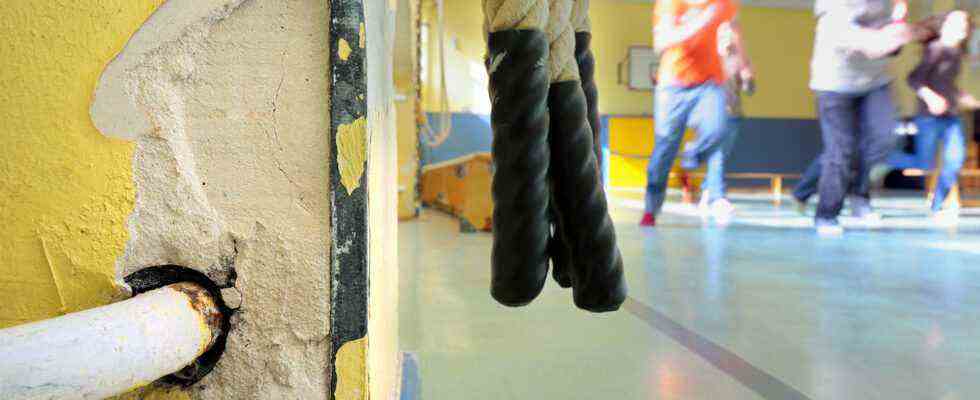Status: 01/15/2022 09:19 am
While some municipalities are generating surpluses, highly indebted cities and municipalities are pushing ahead with a renovation backlog worth billions. Will the traffic light coalition’s plans change anything?
The shortage is visible everywhere: Schools with primeval-looking toilet facilities that are permanently broken. Town houses that are being closed because there is not enough money for fire protection measures. Dilapidated gyms, swimming pools, streets. In some municipalities almost nothing works anymore. Particularly badly hit: towns and villages in Rhineland-Palatinate, in parts of North Rhine-Westphalia and in Saarland. In the latter federal state, all 52 municipalities can be regarded as financially weak in a nationwide comparison.
Actually, the Basic Law prescribes the “equivalence of living conditions” throughout Germany. But a look at the figures reveals a different reality: the investment expenditures of the municipalities in the individual federal states are grossly disproportionate. The municipalities in Bavaria were able to invest an average of 914 euros per inhabitant in 2020, the Bertelsmann Foundation calculated in its municipal finance report. That is more than three times as much as in Saarland, which has been carrying the red lantern for years with 290 euros per inhabitant.
Corona exacerbates the misery
Structurally, the municipalities in the extreme south-west of the republic have significantly more expenditure than income. They have to shoulder high social costs; a consequence of the structural change away from hard coal mining that has not yet been mastered. At the same time, they take comparatively little in taxes and have to service mountains of old debts.
The result: there is hardly any money for anything, the infrastructure is rotting away. In a survey by the Saarland Association of Towns and Municipalities in 2019, the municipalities in Saarland put the renovation backlog at 3.8 billion euros. In the meantime, the association suspects that this sum has increased – despite help from the state and its own efforts, for example Increases in trade and property taxes.
According to the German Association of Towns and Municipalities, cities and municipalities across Germany are pushing ahead with an investment backlog of around 150 billion euros. And the corona pandemic is exacerbating the situation: income from trade and income tax is falling. Public infrastructure is used less – such as bathrooms or libraries. At the same time, however, the costs are increasing. Hygiene measures, controls of the Corona regulations, but also necessary digitization measures are expensive.
The federal government should bear the costs
The German Association of Towns and Municipalities is calling on the federal government to provide another rescue package for the municipalities and a municipal investment offensive. Because unlike in 2020, the federal government no longer reimburses corona-related tax losses. Where things were already tight before the crisis, the situation is now becoming increasingly bleak. Above all, there is a lack of money for the construction and maintenance of buildings: elementary schools, for example, or sports facilities. But the canal system is also rotting away, and cultural and tourism projects fall victim to cutbacks.
“Especially in times of crisis, the goal of equal living conditions must not be lost sight of. The future prospects of our children and equal opportunities must not depend on which region of Germany they live in,” warns the German Association of Towns and Municipalities. A solution to the question of old debts could help.
Scholz stands by his word
The current Chancellor, Olaf Scholz, had already announced this when he was still finance minister in the grand coalition. But for a takeover of old municipal debts, the Basic Law would have to be changed. A broad approval of the parliament and the federal states would be a basic requirement. So far, this has also failed due to the resistance of the CDU. The goal is now fixed in the traffic light coalition agreement as a “one-time effort by the federal and state governments”.
The previous efforts of the countries, it is said, should be taken into account. This is good news for the heavily burdened municipalities in Saarland and Hesse. There, the federal states have already taken over parts of their debts from the municipalities with the Hessenkasse or the Saarland Pact. The chances of the federal government taking over the remaining part seem to have increased.
If you order, you have to pay
The Saarland Town and Municipality Day has appealed for this to happen quickly. And adds: The assumption of debt alone will not be enough. In the future, the federal government will also have to pay consistently if it transfers new tasks to the municipalities, currently for example through the legal right to all-day care for primary school children. Neither investment costs nor running costs should be passed on to the municipalities.
New mammoth tasks are already waiting: Climate change and digitization will also demand billions in investments from the municipalities. The economic structural change will shake some already weakened municipalities again. And where there are no more euros for investments, no attractive location can arise: neither for companies nor for example for young families.
Many municipalities in Germany cannot stop this downward spiral on their own. The traffic light coalition has recognized the problem. Now she has to show that she also wants to solve it. And can.

